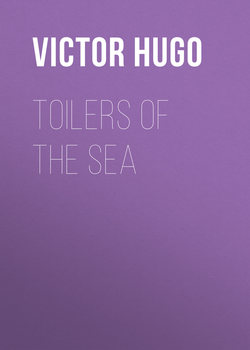Читать книгу Toilers of the Sea - Victor Hugo, Clara Inés Bravo Villarreal - Страница 12
PART I. – SIEUR CLUBIN
BOOK II
MESS LETHIERRY
II
A CERTAIN PREDILECTION
ОглавлениеGilliatt was a child of Nature. Mess Lethierry was the same.
Lethierry's uncultivated nature, however, was not without certain refinements.
He was fastidious upon the subject of women's hands. In his early years, while still a lad, passing from the stage of cabin-boy to that of sailor, he had heard the Admiral de Suffren say, "There goes a pretty girl; but what horrible great red hands." An observation from an admiral on any subject is a command, a law, an authority far above that of an oracle. The exclamation of Admiral de Suffren had rendered Lethierry fastidious and exacting in the matter of small and white hands. His own hand, a large club fist of the colour of mahogany, was like a mallet or a pair of pincers for a friendly grasp, and, tightly closed, would almost break a paving-stone.
He had never married; he had either no inclination for matrimony, or had never found a suitable match. That, perhaps, was due to his being a stickler for hands like those of a duchess. Such hands are, indeed, somewhat rare among the fishermen's daughters at Portbail.
It was whispered, however, that at Rochefort, on the Charente, he had, once upon a time, made the acquaintance of a certain grisette, realising his ideal. She was a pretty girl with graceful hands; but she was a vixen, and had also a habit of scratching. Woe betide any one who attacked her! yet her nails, though capable at a pinch of being turned into claws, were of a cleanliness which left nothing to be desired. It was these peculiarly bewitching nails which had first enchanted and then disturbed the peace of Lethierry, who, fearing that he might one day become no longer master of his mistress, had decided not to conduct that young lady to the nuptial altar.
Another time he met at Aurigny a country girl who pleased him. He thought of marriage, when one of the inhabitants of the place said to him, "I congratulate you; you will have for your wife a good fuel maker." Lethierry asked the meaning of this. It appeared that the country people at Aurigny have a certain custom of collecting manure from their cow-houses, which they throw against a wall, where it is left to dry and fall to the ground. Cakes of dried manure of this kind are used for fuel, and are called coipiaux. A country girl of Aurigny has no chance of getting a husband if she is not a good fuel maker; but the young lady's especial talent only inspired disgust in Lethierry.
Besides, he had in his love matters a kind of rough country folks' philosophy, a sailor-like sort of habit of mind. Always smitten but never enslaved, he boasted of having been in his youth easily conquered by a petticoat, or rather a cotillon; for what is now-a-days called a crinoline, was in his time called a cotillon; a term which, in his use of it, signifies both something more and something less than a wife.
These rude seafaring men of the Norman Archipelago, have a certain amount of shrewdness. Almost all can read and write. On Sundays, little cabin-boys may be seen in those parts, seated upon a coil of ropes, reading, with book in hand. From all time these Norman sailors have had a peculiar satirical vein, and have been famous for clever sayings. It was one of these men, the bold pilot Quéripel, who said to Montgomery, when he sought refuge in Jersey after the unfortunate accident in killing Henry II. at a tournament, with a blow of his lance, "Tête folle a cassé tête vide." Another one, Touzeau, a sea-captain at St. Brélade, was the author of that philosophical pun, erroneously attributed to Camus, "Après la mort, les papes deviennent papillons, et les sires deviennent cirons."
